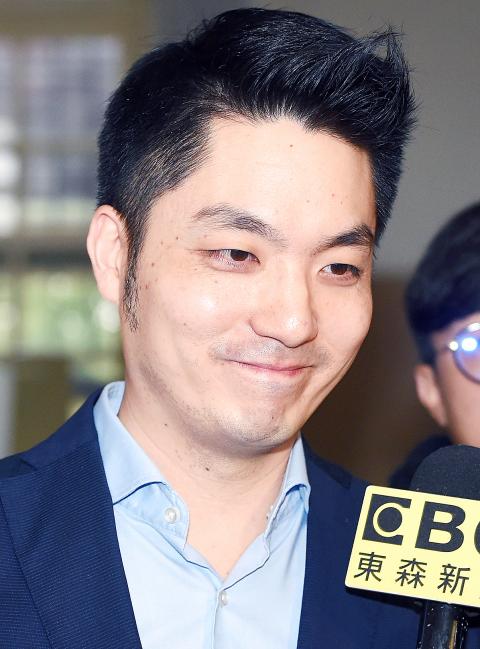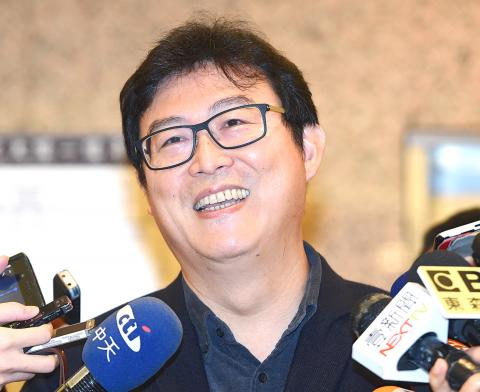Chinese Nationalist Party (KMT) Legislator Chiang Wan-an (蔣萬安) yesterday said that he would not seek the KMT’s nomination for the Taipei mayoral election in November.
“I never said that I would run. I will stay at the Legislative Yuan,” Chiang said.
He said that he would continue as KMT caucus convener for the legislature’s Social Welfare and Environmental Hygiene Committee to check and balance administrative power.

Photo: Liao Chen-huei, Taipei Times
He is to focus his attention on bills that address labor rights, air pollution and food safety when scrutinizing the ruling Democratic Progressive Party (DPP), he added.
Chiang said he decided to remain a legislator after the DPP this month pushed amendments to the Labor Standards Act (勞動基準法) through the legislature, rendering his efforts to review the amendments futile and degrading relevant agencies into “rubber stamps.”
Asked whether the KMT would appoint him as its Taipei mayoral candidate, forcing him to run, he said such a scenario is “out of the question.”

Photo: Liao Chen-huei, Taipei Times
Asked whether he would lend his support to KMT Taipei mayoral candidate hopeful Ting Shou-chung (丁守中), a former KMT legislator, Chiang said he would back anyone who emerges as the winner in the party’s primary.
He had made his position on the election clear to KMT Chairman Wu Den-yih (吳敦義), he added.
KMT caucus whip Lin Te-fu (林德福) said he respected Chiang’s decision.
KMT caucus deputy secretary-general William Tseng (曾銘宗) said he had high hopes for Chiang, but respected his decision.
It is unlikely that Chiang would be “drafted” by the KMT for the Taipei mayoral election, Tseng added.
Separately yesterday, Ting applauded Chiang for deciding to stay in the “battlefield” at the legislature.
“This is an act of shouldering responsibility that deserves recognition,” Ting said, adding that it would take party unity for the KMT to win back Taipei.
KMT Culture and Communications Committee director-general Lee Ming-hsien (李明賢) said he respected Chiang’s decision, adding that it would not affect the party’s plan to nominate someone through a primary who is most likely to win the election.
The nominations of all candidates for city mayor and county commissioner posts in November’s nine-in-one local elections would be based on public opinion polls, rather than surveys of only KMT members, Lee said.
The nomination process for Taipei and New Taipei City mayoral candidates is expected to begin after the Lunar New year holiday next month, he said.
DPP Legislator Pasuya Yao (姚文智), who is seeking the DPP’s nomination for Taipei mayoral candidate, said he was slightly disappointed by Chiang’s announcement.
It would be far more interesting if Chiang is in the race, Yao said.
Chiang’s decision was both graceful and a responsible move, as it allows the KMT to find other candidates in time, he added.
Additional reporting by Stacy Hsu and staff writer

ACTION PLAN: Taiwan would expand procurement from the US and encourage more companies to invest in the US to deepen bilateral cooperation, Lai said The government would not impose reciprocal tariffs in retaliation against US levies, President William Lai (賴清德) said yesterday, as he announced five strategies to address the issue, including pledging to increase Taiwanese companies’ investments in the US. Lai has in the past few days met with administrative and national security officials, as well as representatives from various industries, to explore countermeasures after US President Donald Trump on Wednesday last week announced a 32 percent duty on Taiwanese imports. In a video released yesterday evening, Lai said that Taiwan would not retaliate against the US with higher tariffs and Taiwanese companies’ commitments to

Intelligence agents have recorded 510,000 instances of “controversial information” being spread online by the Chinese Communist Party (CCP) so far this year, the National Security Bureau (NSB) said in a report yesterday, as it warned of artificial intelligence (AI) being employed to generate destabilizing misinformation. The bureau submitted a written report to the Legislative Yuan in preparation for National Security Bureau Director-General Tsai Ming-yen’s (蔡明彥) appearance before the Foreign Affairs and National Defense Committee today. The CCP has been using cognitive warfare to divide Taiwanese society by commenting on controversial issues such as Taiwan Semiconductor Manufacturing Co’s (TSMC, 台積電) investments in the

HELPING HAND: The steering committee of the National Stabilization Fund is expected to hold a meeting to discuss how and when to utilize the fund to help buffer the sell-off The TAIEX plunged 2,065.87 points, or 9.7 percent, to close at 19,232.35 yesterday, the highest single-day percentage loss on record, as investors braced for US President Donald Trump’s tariffs after an extended holiday weekend. Amid the pessimistic atmosphere, 945 listed companies led by large-cap stocks — including Taiwan Semiconductor Manufacturing Co (TSMC, 台積電), Hon Hai Precision Industry Co (鴻海精密) and Largan Precision Co (大立光) — fell by the daily maximum of 10 percent at the close, Taiwan Stock Exchange data showed. The number of listed companies ending limit-down set a new record, the exchange said. The TAIEX plunged by daily maxiumu in just

‘COMPREHENSIVE PLAN’: Lin Chia-lung said that the government was ready to talk about a variety of issues, including investment in and purchases from the US The National Stabilization Fund (NSF) yesterday announced that it would step in to staunch stock market losses for the ninth time in the nation’s history. An NSF board meeting, originally scheduled for Monday next week, was moved to yesterday after stocks plummeted in the wake of US President Donald Trump’s announcement of 32 percent tariffs on Taiwan on Wednesday last week. Board members voted to support the stock market with the NT$500 billion (US$15.15 billion) fund, with injections of funds to begin as soon as today. The NSF in 2000 injected NT$120 billion to stabilize stocks, the most ever. The lowest amount it